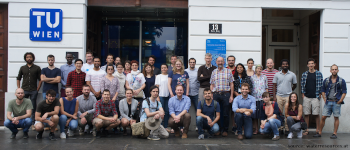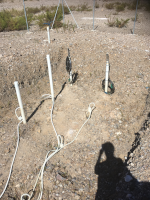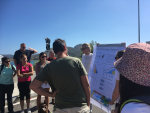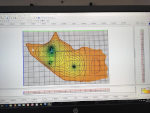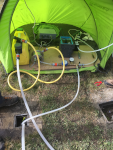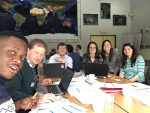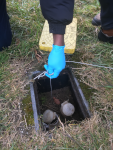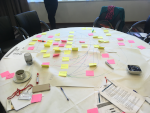Winter School: Principles and application of catchment-scale flow and transport modeling in groundwater
29th of January - 1st of February 2019 | University of Liege - Ulg | Liege, Belgium
During the winter school, I could familiarize myself with the control volume finite element code HydroGeoSphere (HGS) which allows modeling of flow and transport in a coupled surface water – groundwater flow system (two days hands-on exercises, Professor René Therrien, Université Laval, Québec, Canada). The last day of the course was dedicated to the modeling of stable isotopes in aquatic systems (hands-on course, Steffanie Lutz, UFZ Leipzig, Germany).
Lectures: Catchment scale flow and transport modelling: mathematical and numerical aspects (A.Dassargues, U.Liège), Catchment scale flow and transport modelling: the conceptual model and its specific aspects related to catchment scale (P.Orban, U.Liège), Modelling groundwater quality trends at the catchment scale (S.Brouyère, U.Liège), Modelling surface water quality at catchment scale using PEGASE (J-F.Deliège, Aquapôle U.Liège), Model calibration and sensitivity analysis (M.Ramgraber, EAWAG), Using Kalman and particle filters for data assimilation and model uncertainty assessment (M.Ramgraber, EAWAG), Effect of spatial discretization on model performance and prediction uncertainty (S.Wildemeersch, SPAQuE), Modelling agrichemical fluxes at regional and catchment scales using the EPIC-GRID model (A.Degré, U.Liège).
During the winter school, I could present my poster about the usage of Bayesian stable isotope mixing models for nitrate source apportionment.
Winter School: Developing science into practice, including stakeholder involvement
20th - 22nd of March 2017 | INSPIRATION Innovative Training Network | Manchester, UK
The seasonal school consisted of three sessions:
building personal/professional resilience, and project management/communication skills (facilitator form the University of Sheffield),strategies for effective science dissemination and outreach (facilitator from CL:ARIE), andstrategies for developing science into practice (facilitators from Teagasc, Eawag, and Wageningen University).
Each session incorporated a conceptual presentation, group discussion as well as individual and group activities.The application of Environmental Isotopes and compound-specific isotope analysis (CSIA)
17th - 18th of August 2019 | GOLDSCHMIDT 2019 | Barcelona, Spain
During the Goldschmidt 2019 conference, I participated in the workshop dedicated to the application of environmental isotopes and CSIA in contaminated groundwater studies. The workshop aimed to present the latest advancement in the applications of compound-specific isotopes analysis (CSIA) as well as environmental isotopes in characterizing and assessing contaminated sites. The course covered the application of environmental isotopes, 13C, 2H, 18O, 15N, 34S, 87Sr/86Sr, 37Cl, 81Br, 11B and Tritium, to trace the origin of contaminants and the attenuation processes that take place in the aquifer. Many case studies were presented during the workshop. The topics comprise groundwater pollution from agricultural sources (nitrate), industrial activities (e.g., LNAPLs, DNAPLs) as well as urban activities. Furthermore, the course was designed to present the latest advancement in 13C-CSIA, 37Cl-CSIA, 81Br-CSIA, and 2H-CSIA. Isotopes have been successfully used in determining the source of contaminations, understanding the fate of contaminants in the groundwater, and evaluating the effectiveness of remediation actions including the performance assessment for a broad range of biological (natural and enhanced), chemical (e.g., in situ chemical oxidation [ISCO] and permeable reactive barriers [PRB] and physical (e.g., thermal treatment and pump and treat) remediation strategies.
Introduction to Applied Statistics Course
6th - 9th of March 2017 | HIGRADE | Halle, Germany
This course was aimed at the understanding of fundamental concepts in probability and statistical inference as well as their application using R. The course included the introduction to R, a programming language widely used among statisticians.
This course was a very vital experience for me, as I had little experience with the R programming language. The course included instructions on the use of R for every step of the process, which was very helpful for me as a basic user.
The course covered all steps of statistical inference:
design of experiments and sampling protocols,data acquisition,basic statistical analyses (e.g., Chi-square, t-test, ANOVA, correlation, regression),a correct interpretation of statistical results, anddata visualization.I think that such a course can be recommended for every early-stage researcher at the beginning of a Ph.D. project. It helped me to answer questions such as: 'Why do I need statistics?', 'How many replicates do I need', and help avoid questions such as 'Why my 5 years of data is useless?'.Introduction to Time Series Analysis
9th - 12th of January 2018 | HIGRADE | Leipzig, Germany
The course provided a practical introduction to time series analyses. It was helpful for me because in my research I have to deal with a large amount of data collected over a long period of time.
This course covered three main topics:
Data preparation and visualization, dealing with data gaps and methods for interpolation,Finding trends and periodicities using empirical mode decomposition; methods for noise reduction and autocorrelation analysis,Methods for comparing two or more time series with respect to similarities, asynchronism, distance measures.Handling Spatial Data and Mapping in R
15th - 16th of January 2018 | HIGRADE | Leipzig, Germany
This course dealt with the processing and analysis of spatial data in ecological and environmental research. Even though I already had good knowledge about Geographical Information System (GIS) while applying for this course, I can surely say, it was a good decision to participate in it, as I had no previous experience in using R as a GIS environment. After this two day course I was able to import, handle and analyze spatial data (vector, raster) in R. In particular, the following topics are covered:
Projections and transformations,Characteristics and structure of vector and raster data,Data processing (subset, mosaic, mask, etc.),Writing own functions for spatial data,Simple data analysis and spatial statistics,Making maps.Introduction to Geostatistics
15th - 16th of January 2018 | HIGRADE | Leipzig, Germany
Mapping of environment variables, chemicals in the environment, species distributions, ecosystem services, etc. require methods that take into account the spatial structure of measurements/samples. Geostatistical methods provide the tools to do just that. This course helped me to learn basic methods in geostatistics: mainly variogram analysis (empirical and theoretical functions), spatial interpolation (1D and 2D), and kriging.
Software Tools for Collaborative Writing (LaTeX, Git)
6th of November 2017 | HIGRADE | Leipzig, Germany
This course gave me a brief introduction to selected software tools that help researchers to collaborate on any plain-text based document such as software source code, LaTeX- (e.g. reports, papers), R-, CSV- and text files in general. During this one day course, I was introduced to tools and topics such as version control systems (e.g. Git/SVN), collaboration platforms (e.g. GitHub) and tools for online writing (e.g. draftin.com). A simple management technique for the writing/software development process was outlined. The ability to use the software tools covered by this course is essential for every early-stage researcher.
Developing science into practice & Project and time management skills with a focus on academic and industry
20th - 22nd of March 2018 | INSPIRATION ITN | Manchester, UK
The workshop and seasonal school were very helpful and we learned about what it means to be a researcher, what our role as a researcher is, and how to interact with stakeholders and transfer knowledge gained to a wider audience. Additional modules focused on project management skills and how to best organise research outreach activities using the Inspiration ITN conference as an example. The participants also had to form groups and present an end product from their respective working group within the ITN. A presentation was then made to a “Dragons Den” type panel composed of ESR supervisors and the ITN co-ordination team. The panel asked the group questions. This exercise made us think about the end goal and likely outputs of our work at a very early stage in the project. It also forged a team spirit within the ITN and prepared us for keeping our research objective relevant to the overall project objectives and goals. It also made us think about how a scientific endeavour should be communicated to other types of stakeholders.
The use of stable isotopes techniques for assesing biogeochemical cycling of contaminants and nutrients.
14th - 16th of November 2018 | UFZ in Halle & IPREM/CNRS/Universite de Pau et des Pays de l'Adour, Pau, France | Halle, Germany
Workshop organized within MASSTWIN project (poster presentation)
‘Metrology in measurements of stable isotopes of light elements: traceability, uncertainty and comparability’ & ‘Isotopic Techniques in Food Characterization’ Workshop
7th - 9th of December 2016 | Josef Stefan Institute, Department of Environmental Science | Ljubljana, Slovenia
Just a few weeks after I started my project, I participated in the group training on metrology in isotope ratio measurements. The aim of the training was to provide participants with the necessary knowledge to produce quality assured stable isotope ratio data based on metrological principles. The event was organized to coincide with the ERA Chair ISO-FOOD workshop on 'Isotopic Techniques in Food Characterization' held on the 8th to the 9th of December 2016. The target audience of the workshop consisted of early stage researchers (doctoral and postdoctoral level) and application scientists from the EU networks involved in using isotopic methods in food characterization, although the methods discussed were applicable to analytical chemistry in general. The training and the workshop were a great opportunity for me to be introduced to the principles of monitoring the isotope measurements quality, the status of the international scales and reference materials, necessary correction procedures, and a generic scheme for the uncertainty evaluation. I also had a chance to meet researchers from around Europe involved in stable isotope investigations.
31st of January 2017 | Magdeburg, Germany
The internal UFZ 'Mobile Aquatic Mesocosms (MOBICOS)' workshop aimed to introduce the so-called MOBICOS experimental container as a unique research platform. It makes the analysis of ecological processes in running waters as natural as field studies and as controllable as laboratory experiments. Besides group discussion and an afternoon of brainstorming on how to combine different fields of research using the MOBICOS, I found the short field trip very enriching. I got the chance to see one version on how to equip and use such a container. Although MOBICOS does not have direct relevance to my project I am convinced that it offers a great opportunity for long term monitoring studies. In this respect, they may be suitable for the successful monitoring of agricultural management adaption strategies.
Training for Internal Auditor of Environmental Management System
20th - 22nd of July 2015 | AGH University of Science and Technology | Kraków (Poland)
- usage of Environmental Management System,
- good knowledge of ISO 14001 standard,
- carry out internal audit,
Specialist English course in the field of Environmental Protection
10th pf April - 30th of May 2015 | Poliglota Language School, | ul. Długa 88, 31-146 Kraków, Poland
- Extension of vocabulary from the environmental protection field,
- Techniques for writing scientific reports and publications,
- Usage of scientific vocabulary in discussions,
Field Classes in Water Protection
2014 (1 week) | AGH University of Science and Technology | Kraków (Poland)
- water quality indicators measurng: pH, Eh, EC,
- hydrogeologic mapping,
- practical application of groundwater remediation techniques,
Environmental Protection Training
2013 (1 week) | AGH University of Science and Technology | Kraków (Poland)
- study of safe methods for the waste storage and methods for selective collection of municipal waste,
- methods and processes occurring during waste water treatment,
Cartography Field Practice
2012 (2 weeks) | AGH University of Science and Technology | Kraków (Poland)
- cartographic field work methodology,
- cartographic mapping,
- environmental issues, sozology and land development,
2011 (2 weeks) | AGH University of Science and Technology | Kraków (Poland)
- drawing up geological documentation (descriptions, drawings, profiles, maps),
- rocks recognition,
Principles of Good Scientific Practice
23rd of March 2018 | Martin Luther University Halle-Wittenberg | Halle, Germany
The one-day-workshop combined presentations and open discussions focusing on scientific standards of international research. I had a chance to learn about good scientific practice not only in theory but from different case studies as well as from the examples given by the participants. During the course the following topics were covered:
Introduction to good scientific practice,Mentoring in the science system,Misconduct in research,Conflicts of interest in scientific cooperation,Data handling and publishing process.17th of April - 22nd of May 2018 | HIGRADE | Halle, Germany
All early stage researchers are facing difficulties in scientific paper writing. We are confronted with various requirements that are not covered by traditional curricula, e.g. how to structure material for scientific publication, how to communicate results persuasively or what elements distinguish an article that is published from one that is rejected. This course, based on weekly meetings, helped me to obtain the skills necessary to overcome these shortcomings.
Handling Review Processes of Scientific Publications from an Author, Reviewer and Editor Perspective
3rd of May 2018 | HIGRADE | Halle, Germany
At the beginning of my scientific career, the reviewing process was like a black box for me. This course provided me with an overview and practical insights into the process of submission, peer-review and editor-decision. The responsibilities of scientists towards any stage of review procedure were explained, and suggestions of possible ways to influence the outcomes were given. The first part of the course covered an introduction into the process of handling a submission and each player’s responsibility (Editorial Board, the Editor in Chief and the Associate Editors, Author, Reviewer), followed by the elaboration of all procedural steps towards a final decision, and participants’ questions. The second part addressed do's and don’ts for authors with real examples and discussions. The third part addresses the do's and don’ts for reviewers including real examples and the pathway to beneficial use of reviewer reports for a manuscript revision. Final questions and a summary discussion closed the course. A good understanding of how the reviewing process works will help me to publish my research successfully and to avoid unnecessary delays.
